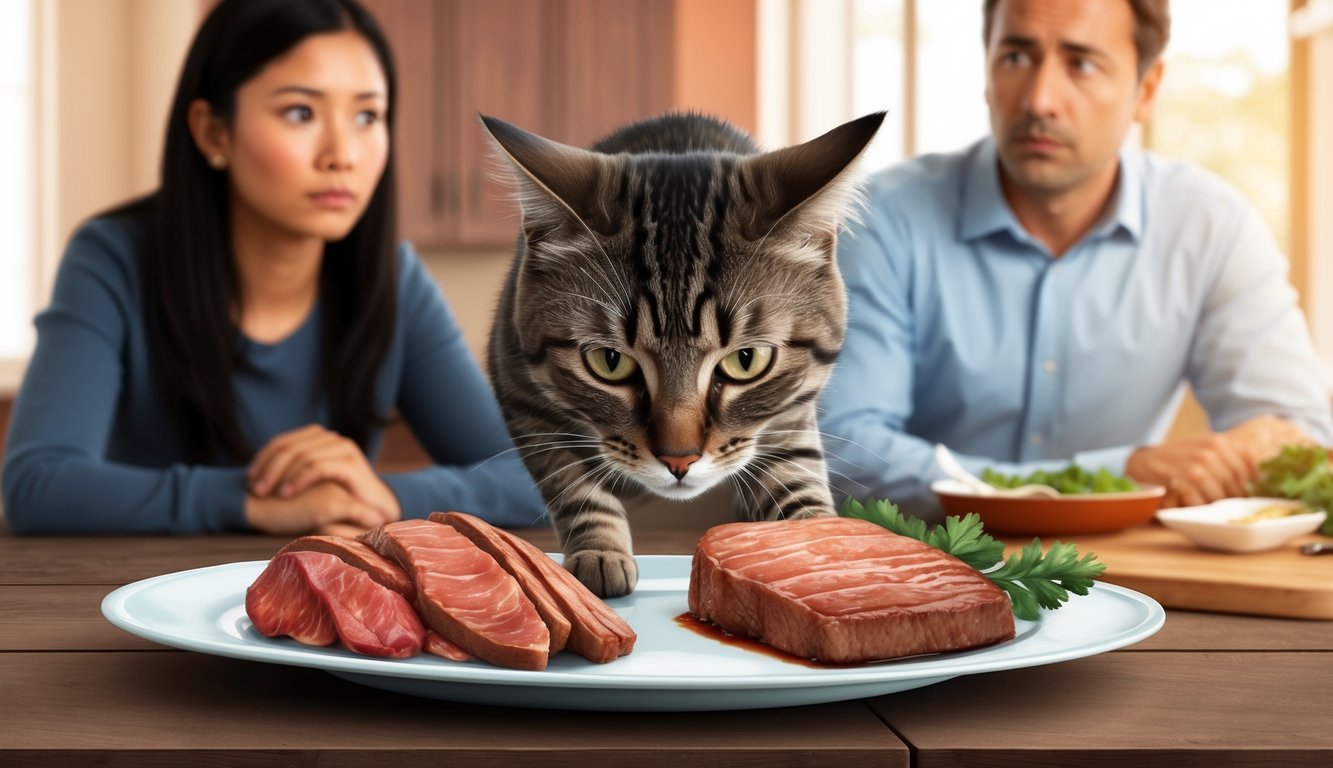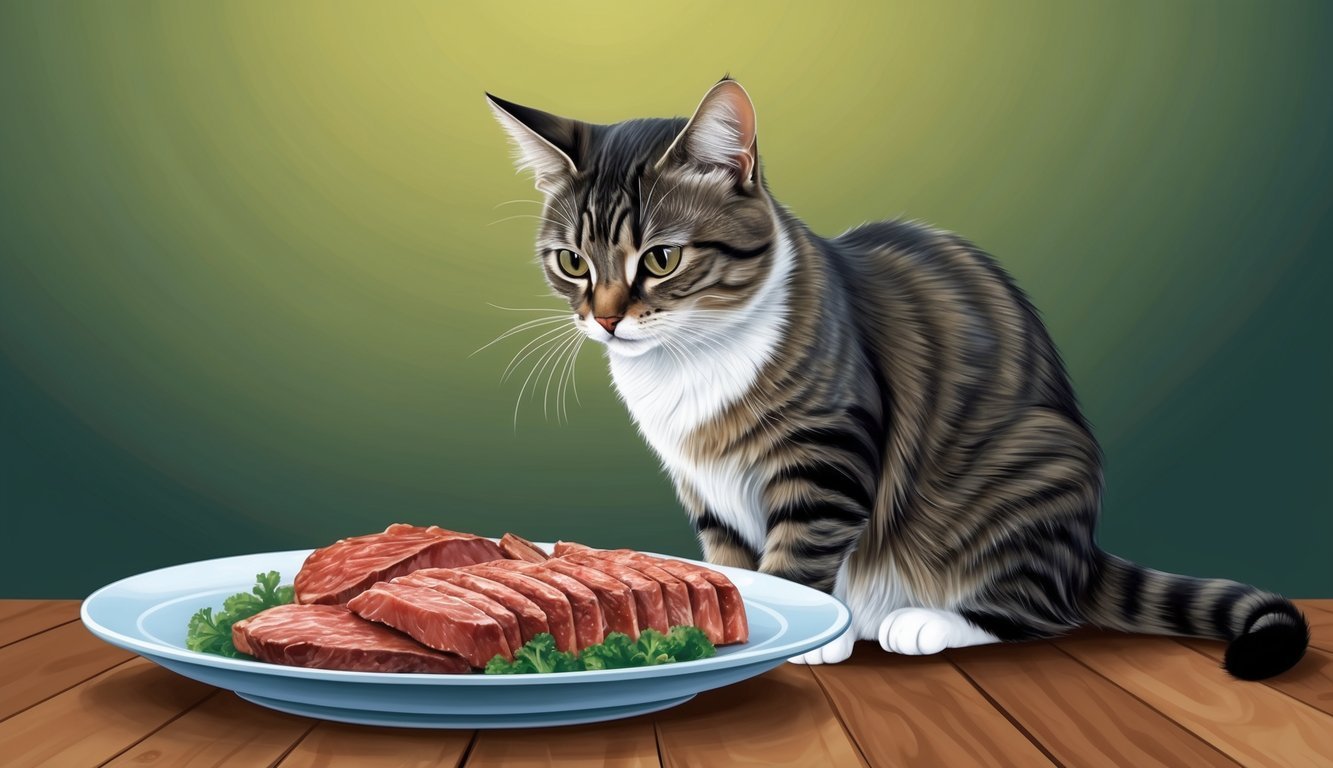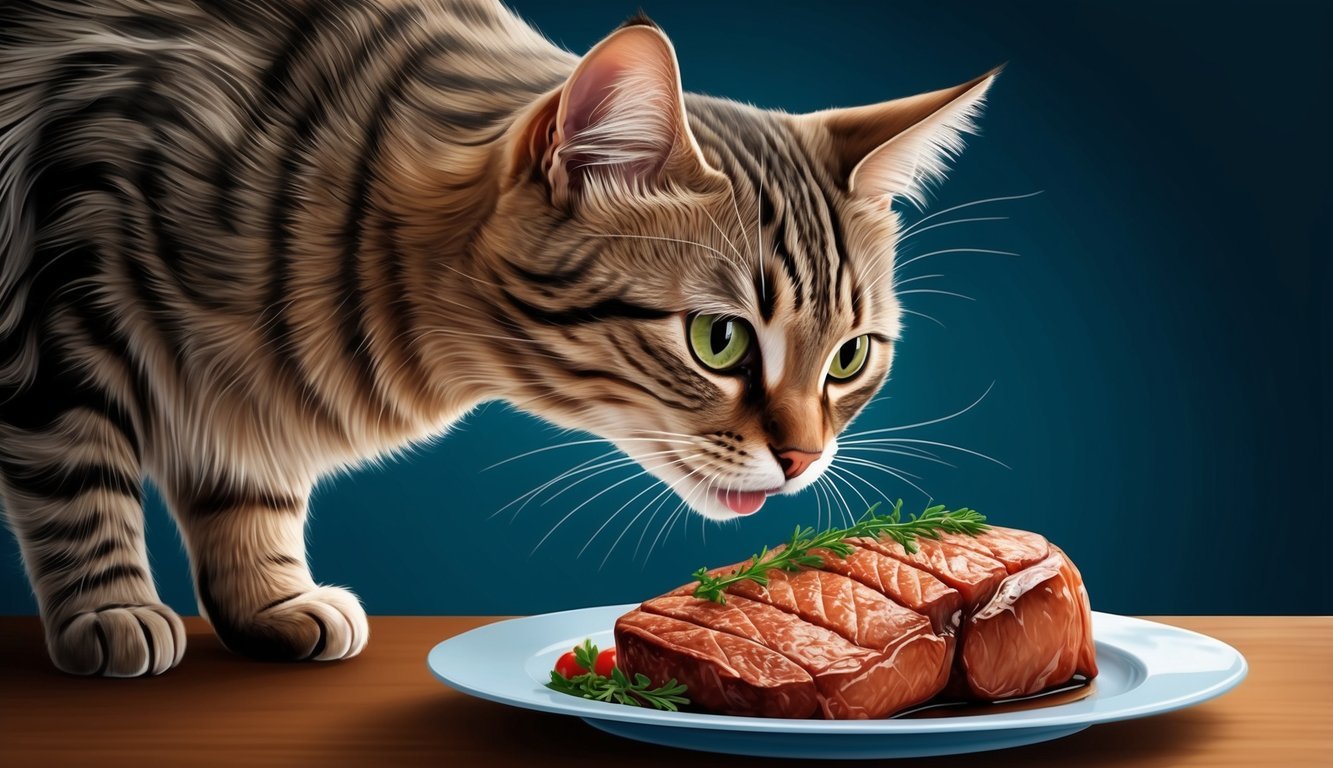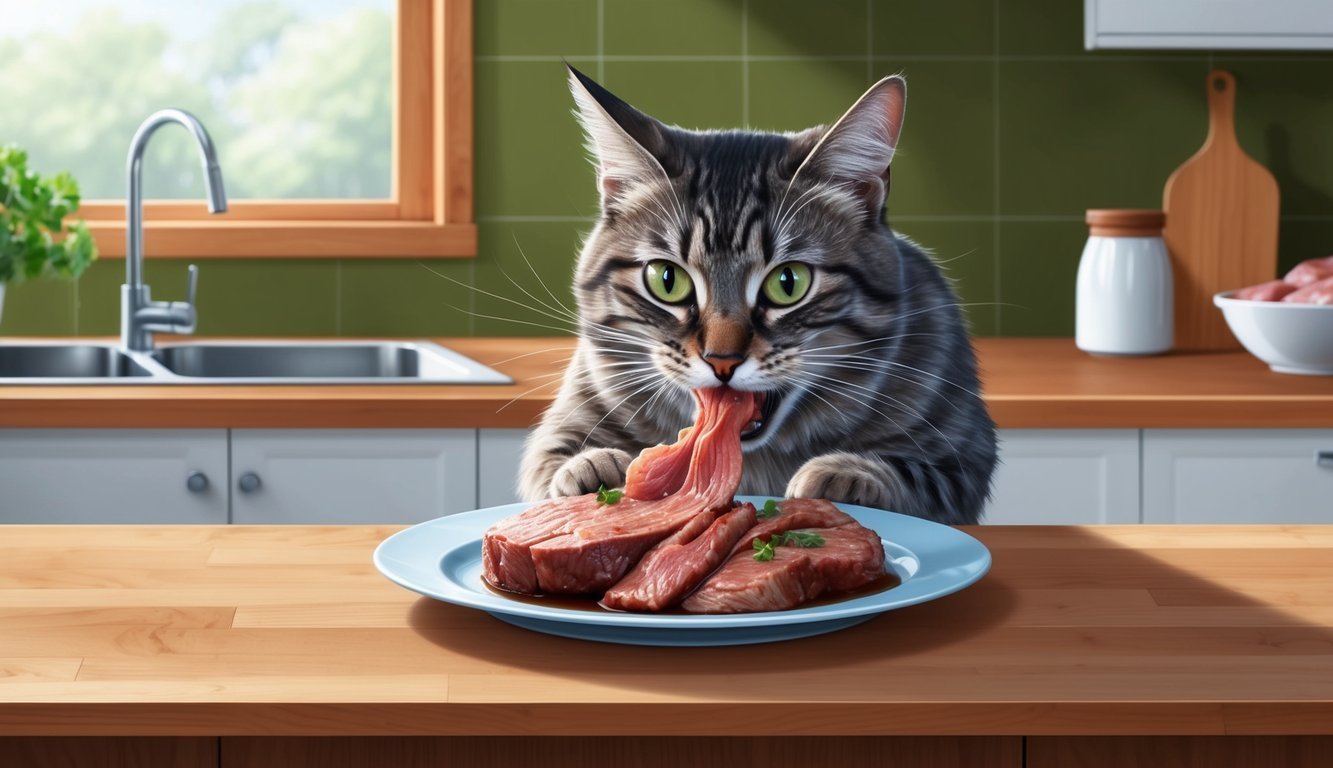Many cat owners wonder about the safety and benefits of feeding their feline friends cooked meat.
Cooked meat can be part of a balanced diet for cats, but you need to prepare it correctly.
This involves ensuring the meat is fully cooked, boneless, and free from harmful seasonings.
Your cat, being an obligate carnivore, thrives on protein-rich diets, making cooked meat a viable option.
While incorporating cooked meat into your cat’s meals can offer various nutritional benefits, it’s important to know which types are safe and the potential risks involved.
For instance, certain meats can be harmful, so understanding how to introduce them safely is crucial.
This article will guide you through feeding your cat cooked meat, addressing common questions and providing practical advice.
By the end, you’ll feel more confident about adding cooked meat to your cat’s diet, ensuring it complements their health and well-being.
You’ll discover the best practices for preparing meat and what to avoid, making mealtime enjoyable for both of you.
Key Takeaways
- Cooked meat can be a safe addition to a cat’s diet when prepared properly.
- Monitor your cat for any adverse reactions when introducing new foods.
- Certain foods, like raw meat and additives, should be avoided for your cat’s health.
The Carnivorous Nature of Cats
Understanding the dietary needs of cats is crucial for their health and well-being.
As obligate carnivores, your feline friends require specific nutrients found only in animal meat.
Let’s dive deeper into what this means for their diet.
Understanding Obligate Carnivores
Cats are classified as obligate carnivores, which means they thrive on a diet primarily composed of animal-derived protein.
Unlike some animals that can obtain nutrients from plants, cats must consume meat to meet their nutritional requirements.
One vital nutrient they can only get from meat is taurine, an essential amino acid.
Taurine plays a critical role in maintaining heart and eye health.
If your cat doesn’t get enough taurine, it could lead to serious health issues.
Additionally, cats lack certain enzymes that are necessary to digest carbohydrates efficiently.
This makes a high-protein, low-carb diet ideal for their well-being.
The Role of Animal Protein in Feline Diets
Animal protein is the cornerstone of a cat’s diet.
It provides not only energy but also essential amino acids that support growth and maintenance of body tissues.
Lean meats, fish, and poultry are excellent options to meet these needs.
When feeding your cat, consider including various protein sources like chicken, turkey, or beef.
However, avoid fatty cuts and seasoned meats, as these may upset their digestive system.
Your cat’s diet should also take into account their dietary restrictions.
Some may have allergies or sensitivities to certain proteins.
Always introduce new food gradually and consult with a veterinarian if you notice adverse reactions.
The Role of Animal Protein in Feline Diets
Animal protein is the cornerstone of a cat’s diet.
It provides not only energy but also essential amino acids that support growth and maintenance of body tissues.
Lean meats, fish, and poultry are excellent options to meet these needs.
When feeding your cat, consider including various protein sources like chicken, turkey, or beef.
However, avoid fatty cuts and seasoned meats, as these may upset their digestive system.
Your cat’s diet should also take into account their dietary restrictions.
Some may have allergies or sensitivities to certain proteins.
Always introduce new food gradually and consult with a veterinarian if you notice adverse reactions.
Benefits of Cooked Meat for Cats
Feeding your cat cooked meat can offer various advantages, including improved safety and digestibility, as well as essential nutrients.
Understanding these benefits helps you make informed decisions about your cat’s diet.
Safety and Digestibility
Cooked meat is generally safer for your cat than raw meat.
Cooking kills harmful bacteria like Salmonella and E. coli that may cause serious health issues.
This process significantly reduces the risk of foodborne illnesses, making it a safer option.
Cats have specific dietary needs, and cooked meat is easier for them to digest compared to raw options.
Cooking breaks down proteins and fats, which allows your cat’s digestive system to absorb nutrients more efficiently.
Just be sure to prepare it thoroughly and avoid using any seasoning or additives.
Nutritional Advantages
Cooked meat can be a great source of high-quality protein that supports muscle health and energy levels.
Protein is crucial for your cat’s overall well-being, aiding in growth, repair, and maintenance of tissues.
You’ll also find vitamins like B6 and B12 in cooked meats.
Vitamin B is essential for energy metabolism and nervous system health.
Additionally, cooked meat provides amino acids that support your cat’s heart health and vision, including taurine, which is vital for feline health.
Potential Issues with Feeding Cats Cooked Meat

Feeding your cat cooked meat can introduce certain challenges.
It’s essential to consider potential nutritional imbalances and possible allergies that may lead to digestive upset.
Nutritional Imbalance
When you feed your cat cooked meat exclusively, you may inadvertently create a nutritional imbalance.
Cats are obligate carnivores, meaning they require a specific balance of nutrients.
For example, while cooked meat delivers protein, it can lack essential vitamins and minerals.
A diet solely based on cooked meat may result in deficiencies.
Taurine, vital for heart health and vision, can be significantly reduced through cooking.
If your cat does not get enough taurine, it may face serious health issues like heart disease.
To maintain a balanced diet, it’s crucial to combine cooked meat with commercially prepared cat food, which is formulated to provide all necessary nutrients.
Risk of Allergies and Digestive Upset
Introducing cooked meat into your cat’s diet can lead to potential food allergies.
Common symptoms of allergies include vomiting, diarrhea, and skin irritations.
If you notice any of these signs after adding cooked meat, consider eliminating it from your cat’s meals.
Moreover, your cat’s digestive system may not handle certain types of meat well, especially if it’s introduced suddenly.
Gradual introduction can help minimize digestive upset.
If you cook meat, avoid seasonings and additives, as these can also contribute to gastrointestinal issues.
Always monitor your cat’s reaction to any new food and consult with a veterinarian if you have concerns.
Incorporating Cooked Meat into a Cat’s Diet
Incorporating cooked meat into your cat’s diet can be beneficial, but you need to do so thoughtfully.
Consider factors such as portion control and choosing the right types of meat to ensure your feline buddy stays healthy and satisfied.
Portion Control and Frequency
When adding cooked meat to your cat’s meals, portion control is key.
A good rule of thumb is to make cooked meat about 10-20% of their daily diet.
This helps maintain a balanced nutritional intake while avoiding overfeeding.
Start with small portions.
For instance, offer a few pieces of cooked chicken or fish as an occasional treat.
Avoid high-fat meats, like pork, which can lead to obesity and health issues.
Monitor your cat’s reaction and adjust accordingly.
Keep an eye on their weight and overall health.
If the addition of cooked meat results in gastrointestinal upset, you may need to reduce the frequency or choose a different type of meat.
Choosing the Right Types of Meat
Not all cooked meats are created equal.
Focus on lean options that provide essential nutrients.
Chicken, turkey, and fish are generally great choices.
- Chicken: Excellent source of protein, but make sure it’s unseasoned and boneless.
- Fish: Rich in omega-3 fatty acids; opt for low-mercury varieties.
- Pork: Offers protein but should be given sparingly due to fat content.
It’s also crucial to ensure the meat is properly cooked to kill harmful bacteria.
Always remove any skin or bones.
Additionally, remember that while cooked meat provides protein, it lacks taurine, an essential amino acid.
A nutrient-rich cat food should still form the base of your cat’s diet, alongside the occasional cooked meat.
Alternative Options to Cooked Meat
When considering alternatives to cooked meat for your cat, several options offer nutritional balance and are safe for felines.
You can find various commercial cat foods specially formulated to meet your cat’s dietary needs or prepare homemade meals.
Wet and dry food varieties also provide convenient choices for feeding.
Commercial Cat Food and Nutritional Balance
Commercial cat food is a reliable alternative to cooked meat.
These products are formulated by pet nutrition experts to ensure a balanced diet for your cat.
Look for foods labeled as “complete and balanced.” This indicates they meet the nutritional standards set by governing bodies, ensuring your cat receives essential nutrients.
Ingredients like meat, fish, and vegetables are common.
Always read the labels for the specific protein sources and avoid those with too many fillers like corn or soy to keep your cat healthy.
Homemade Cat-Friendly Foods
You might consider preparing homemade meals if you prefer a personal touch.
Traditional cat-friendly options include lean meats, like chicken or turkey, and simple vegetables like carrots or pumpkin.
Always cook the meat without any seasoning or sauces.
You can combine it with small amounts of rice or potatoes for added energy.
Including organ meats like liver in moderation provides essential nutrients.
Make sure to consult your veterinarian to ensure your homemade diet meets your cat’s specific health needs and dietary requirements.
Exploring Wet and Dry Cat Food Varieties
Wet and dry cat food present different benefits.
Wet food is generally more palatable and hydrating due to its moisture content.
Cats often enjoy the variety of flavors available in wet food.
On the other hand, dry food offers convenience and helps with dental health.
Its crunchiness can reduce plaque buildup on your cat’s teeth.
It’s wise to combine both types in your cat’s diet for a balance of nutrition and hydration.
Always ensure the foods are labeled safe for cats and check ingredient lists for high-quality protein sources.
Food Items Cats Should Avoid
When it comes to keeping your feline friend healthy, knowing what foods to avoid is crucial.
Certain human foods can be toxic to cats, while raw meat poses other risks.
Here’s what you need to know.
Toxic Human Foods for Cats
Many foods that are safe for you can be harmful to your cat.
Specifically, onions and garlic are part of the Allium family and can damage red blood cells, leading to anemia.
Here are a few other foods to steer clear of:
- Chocolate: Contains theobromine, which is toxic.
- Grapes and Raisins: Can cause kidney damage.
- Xylitol: A sugar substitute that can lead to seizures.
Additionally, some flowers like lilies and daffodils are extremely toxic to cats.
Be mindful of anything you might leave on your dining table, as cats are naturally curious.
Dangers of Raw Meat Consumption
While cats are obligate carnivores, feeding them raw meat can introduce harmful bacteria.
Raw meat may carry salmonella or E. coli, which can lead to severe intestinal issues.
Another concern is that raw fish contains an enzyme that can destroy thiamine, essential for your cat’s health.
A lack of thiamine can result in serious neurological problems, including seizures.
If you choose to feed your cat meat, always ensure it is cooked thoroughly.
Be cautious not to serve unprepared meats, as the risks far outweigh the benefits.
Recognizing and Responding to Food-Related Health Issues

It’s crucial to be aware of how your cat responds to cooked meat, as food-related health issues can arise.
Knowing the signs of these problems and when to seek assistance can ensure your cat remains healthy and happy.
Identifying Symptoms of Food-Related Problems
Watch for symptoms that signal food-related issues in your cat.
Common signs include:
- Vomiting: This may occur shortly after eating, especially if the food is new.
- Digestive Upset: Diarrhea or constipation can indicate your cat is having trouble digesting certain foods.
- Lethargy: If your cat suddenly becomes less active or disinterested in play, it might suggest a health issue.
- Allergies: Signs of food allergies include itching, swelling, or excessive grooming.
In more severe cases, symptoms such as seizures may indicate a serious reaction.
Keeping a close eye on your cat can help you spot these warning signs early.
When to Consult a Veterinarian
If you notice any concerning symptoms, consult your veterinarian promptly.
You should seek immediate assistance if your cat experiences:
- Persistent vomiting or diarrhea lasting more than 24 hours
- Signs of dehydration, such as dry gums or excessive panting
- Sudden changes in behavior, particularly lethargy or aggression
Some symptoms, like kidney damage, can develop after consuming harmful substances or excessive salt, so timely intervention is essential.
Your vet can recommend diagnostic tests to identify the underlying issue and offer appropriate treatment.
It’s better to err on the side of caution when it comes to your cat’s health.
Frequently Asked Questions

Feeding your cat cooked meat can raise several important questions.
Understanding what types of cooked meats are safe, how often to serve them, and any potential health risks is essential for your cat’s well-being.
Is it safe to feed my cat cooked chicken or beef regularly?
Yes, feeding your cat cooked chicken or beef can be safe when done in moderation.
Ensure that both are thoroughly cooked without any seasonings or additives.
Regularly providing lean options like these offers healthy protein.
What types of cooked meats are okay for my cat to eat?
Cats can enjoy several types of cooked meats including chicken, turkey, and lean cuts of beef.
Just make sure to prepare them plainly, removing any bones and avoiding added oils or spices which can be harmful.
Are there any human foods that cats can safely eat every day?
In addition to cooked meats, some human foods like plain cooked eggs or small amounts of certain vegetables can be safe.
However, these should not make up the bulk of your cat’s diet, which should primarily consist of quality cat food.
Should I be cautious about feeding my cat certain meats?
Yes, you should be cautious with meats like pork.
Ensure it is fully cooked to avoid health risks.
Some meats can contain harmful bacteria or parasites when undercooked.
Can serving cooked meat to my cat lead to any health issues?
Serving cooked meat could lead to health issues if it’s not prepared correctly.
Avoid seasoning and always ensure the meat is boneless and well-cooked to decrease the risk of foodborne illnesses.
What’s better for my cat’s diet: raw or cooked meat?
Cooked meat is often safer than raw.
This is because cooking kills harmful bacteria and parasites.
While raw diets have their advocates, the risks associated with bacterial contamination make cooked meat a more common choice for many cat owners.


